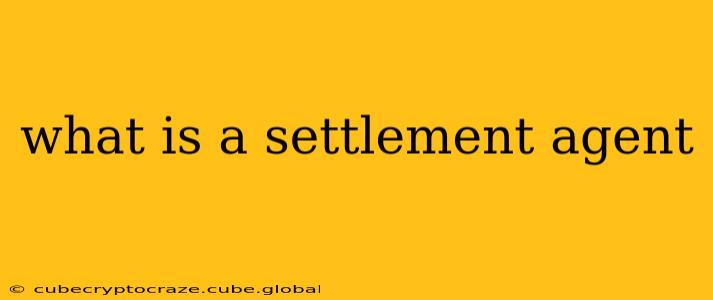A settlement agent, also known as a closing agent or escrow agent, plays a crucial role in real estate transactions. They act as a neutral third party, ensuring a smooth and legally sound transfer of property ownership from seller to buyer. Their responsibilities extend far beyond simply handing over keys; they manage the complex financial and legal aspects of the closing process, protecting both parties' interests. Understanding their function is key to navigating the often intricate world of property settlements.
What are the responsibilities of a settlement agent?
Settlement agents are responsible for a wide array of tasks, ensuring all legal and financial requirements are met before the property changes hands. These responsibilities typically include:
-
Managing the escrow account: This involves receiving and disbursing funds related to the transaction, including the purchase price, down payment, earnest money, and any other associated costs. They hold these funds in a trust account until all conditions of the sale are met.
-
Preparing closing documents: This includes reviewing and preparing all necessary paperwork, such as the deed, mortgage documents, title insurance policies, and other relevant legal instruments. Ensuring accuracy and compliance with all applicable laws is paramount.
-
Conducting title searches: They verify the seller's ownership of the property and identify any liens, encumbrances, or other issues that could affect the transfer of title. A clean title is essential for a successful closing.
-
Calculating closing costs: Settlement agents meticulously calculate and itemize all closing costs for both the buyer and the seller, ensuring transparency and accuracy. This includes taxes, fees, and other expenses related to the transaction.
-
Disbursing funds: After verifying all conditions are met, they distribute the funds according to the terms of the sale agreement. This ensures that the seller receives their proceeds and the buyer's mortgage is properly recorded.
-
Recording documents: Once the closing is complete, they file the necessary documents with the relevant authorities, officially transferring ownership of the property to the buyer.
-
Answering questions and providing support: Settlement agents act as a point of contact for both buyers and sellers, providing guidance and answering any questions they may have throughout the process.
What is the difference between a settlement agent and a real estate agent?
It's crucial to differentiate between a settlement agent and a real estate agent. While both play important roles in a property transaction, their functions are distinct:
-
Real Estate Agent: Represents either the buyer or the seller, negotiating the terms of the sale and advocating for their client's best interests. They focus on marketing, showing properties, and negotiating the price.
-
Settlement Agent: Acts as a neutral third party, managing the financial and legal aspects of the closing process. They ensure the transaction is conducted fairly and legally, protecting both parties.
How do I find a reputable settlement agent?
Choosing a reputable settlement agent is critical. Look for someone with:
- Experience: A proven track record of handling numerous settlements successfully.
- Licensure: Ensure they hold the necessary licenses and certifications in your state or jurisdiction.
- Reputation: Check online reviews and seek recommendations from real estate professionals.
- Transparency: They should be open and communicative throughout the process, providing clear explanations of all costs and procedures.
What are the potential risks of not using a settlement agent?
While not legally required in all jurisdictions, using a settlement agent offers significant benefits. The risks of not using one can include:
- Legal complications: Errors in documentation or missed legal requirements can lead to significant delays and disputes.
- Financial losses: Improper handling of funds can result in financial losses for both buyers and sellers.
- Title issues: Unidentified title problems can create significant problems for the buyer down the line.
What qualifications does a settlement agent need?
The specific qualifications vary by jurisdiction, but generally, settlement agents must meet certain requirements, often including:
- Licensing or Certification: Most states require licensing or certification to act as a settlement agent.
- Background Checks: Thorough background checks are usually conducted to ensure trustworthiness.
- Continuing Education: Ongoing professional development to stay abreast of legal and regulatory changes.
By understanding the role of a settlement agent and selecting a reputable professional, both buyers and sellers can ensure a smooth, efficient, and legally sound property transaction.
